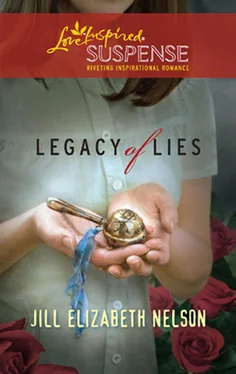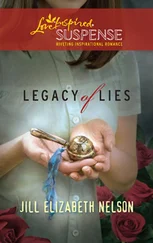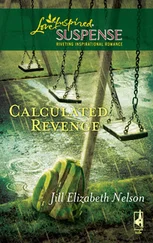“I’m sorry we have to pull things apart like that, but—” Rich started.
“I know. It’s your job.” Nicole waved the sheaf of clippings. “This is a tragic story.”
“Very.” He didn’t add that the Ellings’ legacy of sorrow—mostly self-inflicted—seemed to be passed from one generation to the next.
“Looks like you decided those old records are of interest.” She nodded toward the two boxes he carried and the ones his deputies were loading in the back of the SUV.
“Just taking another long shot.” He smiled at her.
She smiled back. Not very wide and a bit ruefully, but the minor thaw sent his pulse trip-hammering. What might a full-blown grin from her do to his insides? As he stowed his boxes in the SUV, he prayed that he never had to arrest her grandmother and rob himself forever of the chance to find out.
writes what she likes to read—faith-based tales of adventure seasoned with romance. By day she operates as housing manager for a seniors’ apartment complex. By night she turns into a wild and crazy writer who can hardly wait to jot down all the exciting things her characters are telling her, so she can share them with her readers. More about Jill and her books can be found at www.jillelizabethnelson.com. She and her husband live in rural Minnesota, surrounded by the woods and prairie and their four grown children who have settled nearby.
Legacy of Lies
Jill Elizabeth Nelson
www.millsandboon.co.uk
A little while, and the wicked will be no more; Though you look for them, they will not be found. But the meek will inherit the land and enjoy great peace.
—Psalms 37:10–11
To those who hope steadfastly in the Lord for justice to prevail and righteousness and truth to reign.
CHAPTER ONE
CHAPTER TWO
CHAPTER THREE
CHAPTER FOUR
CHAPTER FIVE
CHAPTER SIX
CHAPTER SEVEN
CHAPTER EIGHT
CHAPTER NINE
CHAPTER TEN
CHAPTER ELEVEN
CHAPTER TWELVE
CHAPTER THIRTEEN
CHAPTER FOURTEEN
CHAPTER FIFTEEN
CHAPTER SIXTEEN
CHAPTER SEVENTEEN
EPILOGUE
LETTER TO READER
QUESTIONS FOR DISCUSSION
“Over my dead body!” Nicole Mattson’s grandmother whirled away from the stove and planted wire-veined hands on plump hips. “Jan’s Sewing Room has sold fabric, patterns and sewing notions for sixty years. I’m not about to toss that heritage out the door to convert to this new-fangled machine embroidery.” She said the final words with a twist to her lips that suggested she’d tasted something nasty.
Nicole finished shredding lettuce into a bowl and turned from the counter, wiping her hands on a towel. Her gaze met her grandmother’s glare. Hopefully, her own eyes contained the winsome mix of firm reason and gentle persuasion she was striving for, rather than the frustration she was trying to hide.
“I’m not saying we should throw all the conventional sewing materials out,” she said, “but we need to pare that inventory down and make room for machines that will produce items people will buy in volume. We could market jackets and T-shirts and sweatshirts to schools, businesses, service organizations, churches…” She waved an expansive hand.
Her grandmother sniffed. “But what about the clientele I’ve built up over a lifetime? They want a quiet place to browse for creative projects—not mindless boilerplate logos and images.”
Gritting her teeth, Nicole began chopping fresh vegetables for the salad. Nothing she’d said so far had convinced Grandma Jan that computers and machines could mix with creativity. Maybe the financial approach would work.
“I’ve studied the shop’s books,” Nicole said. “J.S.R. hasn’t turned a profit in this century.” She stopped herself from adding that if the house and shop weren’t owned free and clear, and if Grandpa, former president of one of the two banks in town, hadn’t left his wife well-fixed, the stubborn woman might be out in the street. “Let the machine embroidery end of the business be my thing. If I’m going to live here, I need to support myself.”
A little of the stiffness drained from her grandmother’s posture. “Give yourself time to recover from the loss of your husband before you get all caught up in making a living, honey. It’s been barely six months since Glen was killed. I remember it took me more than a year to have a clear thought in my head after your grandpa passed. That’s why I invited you to come stay with me. We widows need to take care of each other, and the shop will take care of us. It always has.” She went back to tending the meat hissing in her frying pan. “Business will pick up. You’ll see. In this economy, more people will think about making their own clothes.”
Nicole swallowed a sharp answer. Grandma was living in ancient history if she thought many women were going to add sewing clothes for the family to their hectic schedule, especially when most needed to hold down jobs outside the home. Besides, handmade clothing wasn’t that much cheaper than store-bought anymore. Not that her grandmother would realize such a thing when she continued to sew her own slacks, blouses and dresses. No jeans or T-shirts for Janet Keller, though they were Nicole’s favorite garb.
Grandma commenced humming as she added salt to boiling potatoes. Nicole finished the salad, set it on the table and slipped out the back door onto the small deck. The muggy warmth of a summer evening embraced her. The humidity was preferable to the heavy aroma of side pork frying in grease. No wonder Grandma’s cholesterol was sky-high. And in the last couple of weeks since Nicole arrived in the little town of Ellington, the woman claimed her granddaughter was too thin and needed plumping up. One more excuse to defy doctor’s orders and refuse to change her diet. Nicole grimaced.
Grandma would give a soul in need the shirt off her back—or hand-make them one—but if there was an award for being set in one’s ways, she would win it. Every change was always “over my dead body.” Nicole ran splayed fingers through thick, dark hair and released a long sigh.
Her gaze scanned the quiet residential neighborhood in the small town of Ellington. A few of the 1920s bungalows had aged less gracefully than the Keller home, the oldest house in the neighborhood and the only towering colonial. Typical of the Kellers to march to a different drummer, but they paid meticulous care to what they owned. Not that anyone’s property was particularly attractive at the moment. The paving, curbs and gutters had recently been torn off the streets to allow replacement of the underground water and sewer pipes, leaving rutted dirt tracks and, in some places, freshly dug pits instead of roads. Navigation was a challenge in any direction from this corner lot. A distant boom echoed. The big equipment worked on into the evening in another area of town.
A pervasive sadness sifted through Nicole. Change happened whether a person planned it or not—and not always for the good. An image of Glen in his uniform, flashing his winsome grin, darted past her mind’s eye. She huffed against a stab of pain in her chest where her heart should be. That organ had felt cold and dead since the sun-bright winter day Glen’s captain showed up on her doorstep in full-dress blues, hat in hand.
Melancholy pressed Nicole onto a chair on the deck. When she was growing up and her parents brought her to visit Grandma Jan and Grandpa Frank in this west-central Minnesota town, the lawn was a living carpet of thick grass, thriving plants and lush flowerbeds. Since Grandpa’s death a decade ago, when Nicole was twenty-two—a young woman barely wed!—the plants had disappeared one by one, and the flowerbeds had shrunk to a few clumps of petunias here and there. Grandma was not the green thumb in the family, though she’d done her best to maintain Grandpa’s beloved rose garden that lined the property along Tenth Street.
Читать дальше












